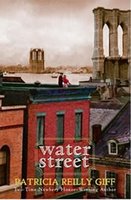 This lush historical novel takes place during the summer of 1875 and spring of 1876. We are introduced to two diverse immigrant families, the Mallon’s’ and the Neary’s, both of whom are able to see the Brooklyn Bridge being built from their apartment on Water Street. Bird Mallon, one of three children to working class Irish immigrants, is an eighth grader in her last year of school who wants to be a healer like her mother. Thomas Neary, a new neighbor and classmate of Bird, is the only son of an alcoholic and lives his life writing in his journal. Giff takes readers through a year in their life, providing a chapter for each voice, eloquently depicting the hardships of poverty, street gangs, education, and unemployment. Readers will be enthralled by the hope Bird and Thomas have in the future. A possible classroom read aloud, Water Street would effectively enhance lessons for this period of American history.
This lush historical novel takes place during the summer of 1875 and spring of 1876. We are introduced to two diverse immigrant families, the Mallon’s’ and the Neary’s, both of whom are able to see the Brooklyn Bridge being built from their apartment on Water Street. Bird Mallon, one of three children to working class Irish immigrants, is an eighth grader in her last year of school who wants to be a healer like her mother. Thomas Neary, a new neighbor and classmate of Bird, is the only son of an alcoholic and lives his life writing in his journal. Giff takes readers through a year in their life, providing a chapter for each voice, eloquently depicting the hardships of poverty, street gangs, education, and unemployment. Readers will be enthralled by the hope Bird and Thomas have in the future. A possible classroom read aloud, Water Street would effectively enhance lessons for this period of American history. In my opinion, one of the most outstanding aspects about this book is Giff's understanding of the time periods hardships and her understated manner. Students reading this book are going to get a fine glimpse of what life might have been like during 1875. They will be entralled and horrified by the fact that 8th grade was graduation, that children of thirteen were working in factories, and that books were a luxury not everyone could easily afford. Also of interest was the "happily ever after" portion of this book. It could have been overdone, but we are treated to simply a glance of Bird and Thomas's life as adults and allowed to imagine what we would like. Or, quite possibly, wait until the next book in this collection is published. Well done historical fiction, it reminded me in some ways of Out of this Furnace, by Thomas Bell.
Tags: Water Street, Patricia Reilly Giff, Children's literature, Book Review, Brooklyn Bridge - juvenile fiction
No comments:
Post a Comment